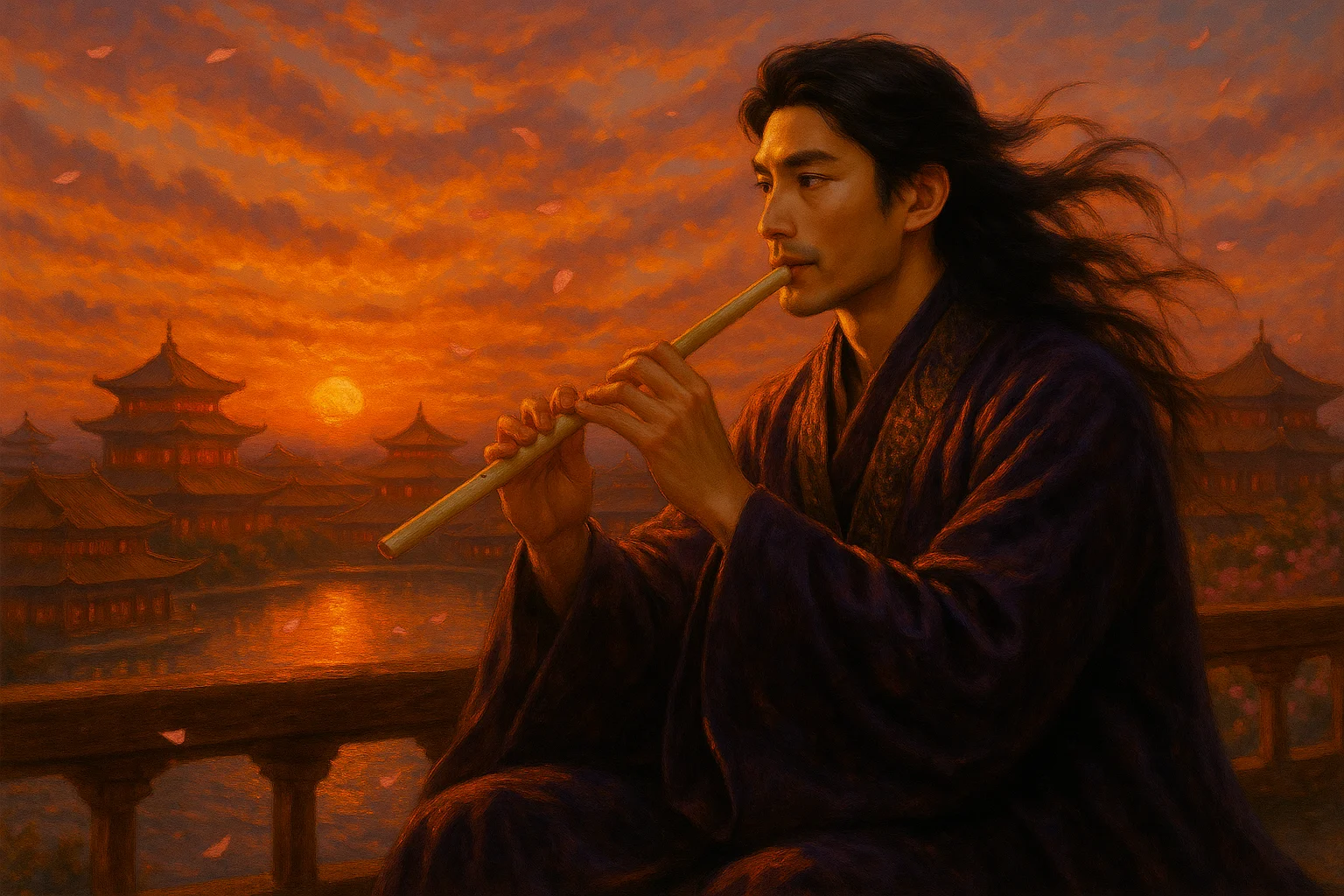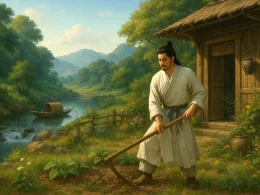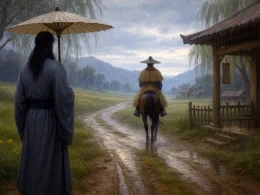Sparse are the red flowers along the path;
Green runs riot o’er fragrant fields.
From a high tower thick leafy trees are seen.
The vernal breeze won’t stop willow down from its path,
But lets it fly wanton into faces of men.
Orioles hide amid emerald leaves,
Swallows peep through crimson screens.
Incense smoke curls up like floating threads unseen.
Awake from wine and sad dreams, I find again
The slanting sun lighting up a courtyard deep and green.
Original Poem
「踏莎行 · 小径红稀」
小径红稀,芳郊绿遍。
高台树色阴阴见。
春风不解禁杨花,蒙蒙乱扑行人面。翠叶藏莺,朱帘隔燕。
晏殊
炉香静逐游丝转。
一场愁梦酒醒时,斜阳却照深深院。
Interpretation
This lyric was likely composed during Ouyang Xiu's middle age, a period marked by repeated political demotions and a melancholy state of mind. Set in the transitional season between late spring and early summer—as flowers fade while greenery flourishes—the poem perfectly mirrors the poet's heightened sensitivity to the passage of time and life's impermanence. A master of embedding emotions in landscapes, Ouyang here uses external seasonal shifts to reflect internal emotional fluctuations, ultimately expressing profound lamentation over beauty's transience and life's dreamlike fragility.
First Stanza: "小径红稀,芳郊绿遍。高台树色阴阴见。"
Xiǎo jìng hóng xī, fāng jiāo lǜ biàn. Gāo tái shù sè yīn yīn jiàn.
Sparse red blooms along the path, / While fragrant fields drown in emerald green. / From the high terrace, trees loom darkly— / layer upon layer of shadows seen.
These opening lines sketch a countryside scene in seasonal transition: fading blossoms give way to overwhelming verdancy. Though seemingly vibrant, the "sparse red" against "ubiquitous green" subtly signals spring's departure. The phrase "shadows seen" (阴阴见) visually deepens the seasonal shift, foreshadowing the emotional turn to follow. This chromatic contrast of depletion and abundance reflects the poet's acute awareness of time's flow.
"春风不解禁杨花,蒙蒙乱扑行人面。"
Chūn fēng bù jiě jìn yáng huā, méng méng luàn pū xíng rén miàn.
The spring wind, knowing no restraint, / Lets willow catkins run riot— / A misty onslaught against travelers' faces.
Personifying nature, the wind's "unrestrained" behavior mirrors emotional turbulence. The invasive catkins—traditional symbols of rootlessness and evanescence (as Li Qingzhao wrote: "The west wind rolls up the curtain—I'm thinner than yellow flowers")—here embody Ouyang's restless melancholy over spring's refusal to linger. Their chaotic assault suggests both sensory irritation and psychological disquiet.
Second Stanza: "翠叶藏莺,朱帘隔燕。炉香静逐游丝转。"
Cuì yè cáng yīng, zhū lián gé yàn. Lú xiāng jìng zhú yóu sī zhuǎn.
Warblers hide in jade leaves, / Scarlet drapes bar the darting swallows. / Incense from the burner quietly chases / floating gossamer through the shadows.
This stanza weaves auditory, visual, and olfactory impressions into a tapestry of restrained dynamism. The "hidden warblers" and "barred swallows"—typical spring emblems—are rendered elusive, intensifying the solitude. The exquisite line "incense chasing gossamer" materializes time's silent, swirling passage, echoing the poet's aimless contemplations.
"一场愁梦酒醒时,斜阳却照深深院。"
Yī chǎng chóu mèng jiǔ xǐng shí, xié yáng què zhào shēn shēn yuàn.
Waking from a wine-drenched dream of sorrow, / I find the slanting sun already glowing / in this courtyard's deepest hollow.
The climax arrives with visceral impact: the "drunken dream of sorrow" (愁梦)—less literal sleep than a metaphor for life's troubled musings—gives way to the harsh light of late afternoon. The "slanting sun" (斜阳) doubly signifies both the dying day and life's twilight, while the "deep courtyard" (深深院) becomes a spatial metaphor for the psyche's secluded chambers—heavy with unspoken years and echoing isolation.
Holistic Appreciation
This lyric poem begins with wildflowers in the countryside, transitions to the quiet scenery of a courtyard, and finally delves into the inner world of dreams, forming a spatial and emotional progression from far to near, from movement to stillness, and from scenery to sentiment. The opening lines depict the scene of fading spring—beautiful yet sorrowful—followed by the unsettling image of willow catkins clinging to one's face, reflecting the protagonist's restless state of mind. The second stanza shifts to the daily life of the courtyard, where incense smoke, floating gossamer, curtain shadows, and swallows' chirps all exude tranquility yet also profound loneliness.
In the concluding lines, the poet condenses all emotions between "sobering from a drunken dream" and "the setting sun in the deep courtyard," gazing at the departed spring and irreversible years in the twilight, allowing the poem's melancholic tone to permeate both imagery and diction. As noted in Anthology of Ci Poetry, "Amidst its gentle softness lies profound depth and lingering sentiment."
This is not merely a seasonal poem but a meditation on time itself, filled with deep reflections on the passage of life and the nuances of human emotion.
Artistic Merits
- Fusion of Scene and Emotion, Emotion Born from Scenery: The poet selects the late spring and early summer landscapes of the countryside and courtyard, using sparse flowers, lush grass, orioles, swallows, floating gossamer, and slanting sunlight to construct a delicate space, embedding emotions within the scenery with subtlety and grace.
- Complex Imagery, Layered Symbolism: Elements like "willow catkins" symbolize wandering, "floating gossamer" represents time and thoughts, and "slanting sunlight" metaphorically suggests the twilight of life—all extracting psychological and philosophical dimensions from common scenery.
- Elegant Language, Natural Transitions: The opening lines paint the scenery briskly, the middle section quietly draws emotion from observation, and the concluding lines suddenly shift to sorrow without losing rhythm, flowing effortlessly with a well-paced progression of emotional layers.
- Dramatic and Psychological Depth in Structure: Moving from countryside to home, from movement to stillness, and from scenery to dreams, the poem achieves a theatrical quality and introspective profundity.
Insights
Even the most vibrant spring must eventually fade into solitude, and every beautiful moment in life is but a fleeting instant. The value of poetry lies in transforming these ephemeral moments into eternal emotional records. With a light touch, the poet captures the instant of willow catkins drifting, incense smoke swirling, and sunlight slanting into the courtyard, turning the transient breath of spring into an everlasting lament—reminding us to cherish the present and not squander time. Even amid life's sorrows and the emptiness of waking from dreams, we can still find profound meaning and beauty in the details.
Poem Translator
Xu Yuanchong (许渊冲)
About the Poet

Yan Shu (晏殊 991 – 1055) Originaire de Fuzhou dans le Jiangxi, Yan Shu fut le maître fondateur de l'école wanyue (élégante et retenue) de la poésie ci sous les Song du Nord. Enfant prodige entré dans l'administration à quatorze ans, ses ci allient noblesse classique et méditation philosophique dissimulée sous des évocations de prospérité raffinée. Mentor de talents comme Fan Zhongyan et Ouyang Xiu, il initia l'École du Jiangxi en poésie ci et posa les bases de l'épuration du genre sous les Song.












